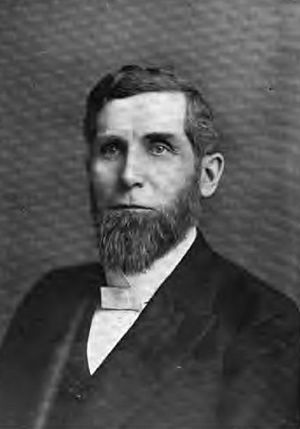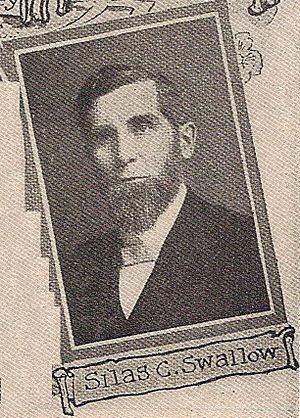Silas C. Swallow facts for kids
Quick facts for kids
Silas Swallow
|
|
|---|---|
 |
|
| Personal details | |
| Born |
Silas Comfort Swallow
March 5, 1839 Wilkes-Barre, Pennsylvania, U.S. |
| Died | August 13, 1930 (aged 91) Harrisburg, Pennsylvania, U.S. |
| Political party | Prohibition |
| Spouse | Rebecca Louise Robins |
| Parents |
|
| Education | Wyoming Seminary Taylor University |
| Military service | |
| Allegiance | |
| Branch/service | Union Army |
| Rank | First lieutenant |
| Unit | 18th Pennsylvania Volunteer Infantry Regiment |
| Battles/wars | American Civil War |
Silas Comfort Swallow (born March 5, 1839 – died August 13, 1930) was an important figure in United States history. He was a Methodist preacher and a politician who believed in prohibition. This meant he was against alcohol. He also spent his whole life fighting against slavery.
Contents
Early Life and Strong Beliefs
Silas Comfort Swallow was born in Wilkes-Barre, Pennsylvania, on March 5, 1839. His parents were George Swallow and Sarah Thompson. He was named after another Methodist preacher, Silas Comfort, who also opposed slavery.
From age 16 to 21, Silas worked as a school teacher. He later studied law, learning about rules and justice. He believed in fairness for everyone. While working as a preacher, he stood up for what he believed was right, even when it was unpopular.
A Life of Service
Serving His Country
In 1862, Silas joined the Union Army during the American Civil War. He became a First lieutenant in the 18th Pennsylvania Volunteer Infantry Regiment. He helped fight for the Union.
Church and Community Work
After the war, Silas became a Methodist preacher. He joined the Baltimore Conference in 1863. Later, he helped start the Central Pennsylvania Conference in 1869. On January 20, 1866, he married Rebecca Louise Robins.
Silas was very busy. He helped build churches and led different church districts. He also became the editor of a newspaper called The Central Pennsylvania Methodist. In his newspaper, he wrote about important issues. He spoke out against alcohol and political corruption. He believed in honest government.
Standing for What's Right
Silas was very outspoken in his newspaper. He criticized political corruption in the state government. Because of his strong opinions, he faced legal challenges. However, a higher court later cleared his name. In 1901, some people criticized him for an article he wrote about President William McKinley shortly after the president's death.
Politics and Presidential Campaigns
Silas Comfort Swallow was a member of the Prohibition Party. This party wanted to make alcohol illegal. He ran for many political offices in Pennsylvania, including Mayor of Harrisburg and Governor. When he ran for governor in 1898, he received a lot of support. He got 13% of the votes in the election.
He also tried to become the Prohibition Party's candidate for president. In the 1900 United States presidential election, he almost won the nomination. In the 1904 United States presidential election, he was chosen as the Prohibition Party's presidential candidate. He ran with George Washington Carroll as his running mate. In that election, he received 259,102 votes. This was one of the highest vote totals ever for the Prohibition Party.
Later Years
Silas Comfort Swallow passed away at his home in Harrisburg, Pennsylvania, on August 13, 1930. He was 91 years old. He was buried at Paxtang Cemetery near Harrisburg.
Church Appointments
Dr. Swallow served in many different church roles throughout his life. Here are some of his official appointments:
- 1863–1864 Milton circuit.
- 1864–1866 Berwick.
- 1866–1868 Catawissa.
- 1868–1871 Newberry.
- 1871–1873 Williamsport Third Street.
- 1873–1875 Milton.
- 1875–1877 Altoona Eighth Avenue.
- 1877–1881 presiding elder, Altoona District.
- 1881–1884 York First.
- 1884–1886 Williamsport Grace.
- 1886–1887 agent, Dickinson College.
- 1887–1892 Harrisburg Ridge Avenue.
- 1892–1902 superintendent, Harrisburg Methodist book room.
- 1902–1908 no appointment, by request.
- 1908–1930 retired.
His Writings
Silas Swallow was also a writer. He wanted to make sure his life story was remembered. When he turned 70 in 1909, he published a long book about his life called III Score and X – Selections, Collections, Recollections of Seventy Busy Years.
This book was very popular, so he wrote more updates:
- Toasts and Roasts of III Score and X, in 1911.
- Then and Now – Some Reminiscences of an Octogenarian, in 1919. (An octogenarian is someone in their 80s.)
- IV Score and More, in 1922.
He also wrote many shorter books and pamphlets. These writings covered different topics, from his thoughts on Camp Meetings and the Sabbath (1879) to A Sermon on Thanksgiving and Thanksliving (1917). All his writings are kept safe in the archives of the Central Pennsylvania Conference of the United Methodist Church.
 | Claudette Colvin |
 | Myrlie Evers-Williams |
 | Alberta Odell Jones |


